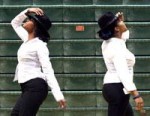Inspiring novelist tells her own story

“This is the biggest weapon I have, these words.”
That was Edwidge Danticat’s answer Tuesday night to an audience’s question about what writers can do to change the world.
Danticat read from her newest book, Brother, I’m Dying, to a crowd of listeners that included students, Haitian activists and poets at the Corral at the Sun Dome. She was preceded by dancers from Club Creole, the event’s co-sponsor.
The book will be released in September 2007, and recounts a time of both “difficult and wonderful events” in the young writer’s life based on a period of time beginning July 2004, during which Danticat’s father and uncle both died and she learned that she was pregnant. Though her book touches on heavy issues, there was laughter in the room when Danticat retold the story of how her father, even as he was dying, told her about a person who became a doctor at 38, which is her age. She related the pressures that Haitians and many immigrant parents put on their children to become lawyers and doctors, rather than “less safe” careers in the arts. The book is her first attempt at autobiographical writing. Danticat’s uncle raised her in Haiti before she joined her parents in the United States when she was 12. The book recreates the story of his mysterious death. He fled Haiti and landed in an immigration detention center in Miami after being mistakenly accused of helping the Haitian government kill 15 suspected gang members.
Danticat’s uncle Joseph was born in 1923 during the United States’ 19-year occupation of Haiti. His death in the detention center at the age of 81 prompted Danticat to declare with solemn cynicism that he “was born and died under the U.S. flag.” Danticat, who lived in Miami at the time, was denied access to him, and none of his family members knew that he lay dying in the detention center. She called his death and the circumstances surrounding it a “shrouded narrative” and described her need, both as his niece and as a writer, for closure.
Danticat interviewed family members meticulously and was able to piece together the events of that Sunday morning in Haiti that lead to her uncle’s need to flee the country.
Her 30-minute reading showcased her ability to blend rich religious imagery and metaphors, melodic Creole phrases and names with heartbreaking descriptions of horrific violence carried out by gangs, Haitian police and United Nations Peacekeeping Forces. She discussed the betrayal of Haitian police and U.N. forces, who were supposed to be there to protect people but only protected the interests of the rich. After her reading, she took questions from the audience. When asked who her biggest influences have been, she responded not by naming authors but by saying that “history is a very strong influence for me. My elders instilled in me the need to look for places where history weaves with life.”Danticat thanked USF for having her on campus and thought it was especially appropriate that she was here during Black History Month. She spoke of bridge building and hoped her talk would mend ties between blacks and Haitians as Frederick Douglass had when he served on the General Council during Haiti’s rise to independence.
The need to remember one’s history is an all-too-pressing issue for those who’ve left their homelands to settle in other countries. On the subject of immigration, Danticat said: “When you leave, you carry very little with you other than your stories. You hope your memories won’t die in this new space.”






